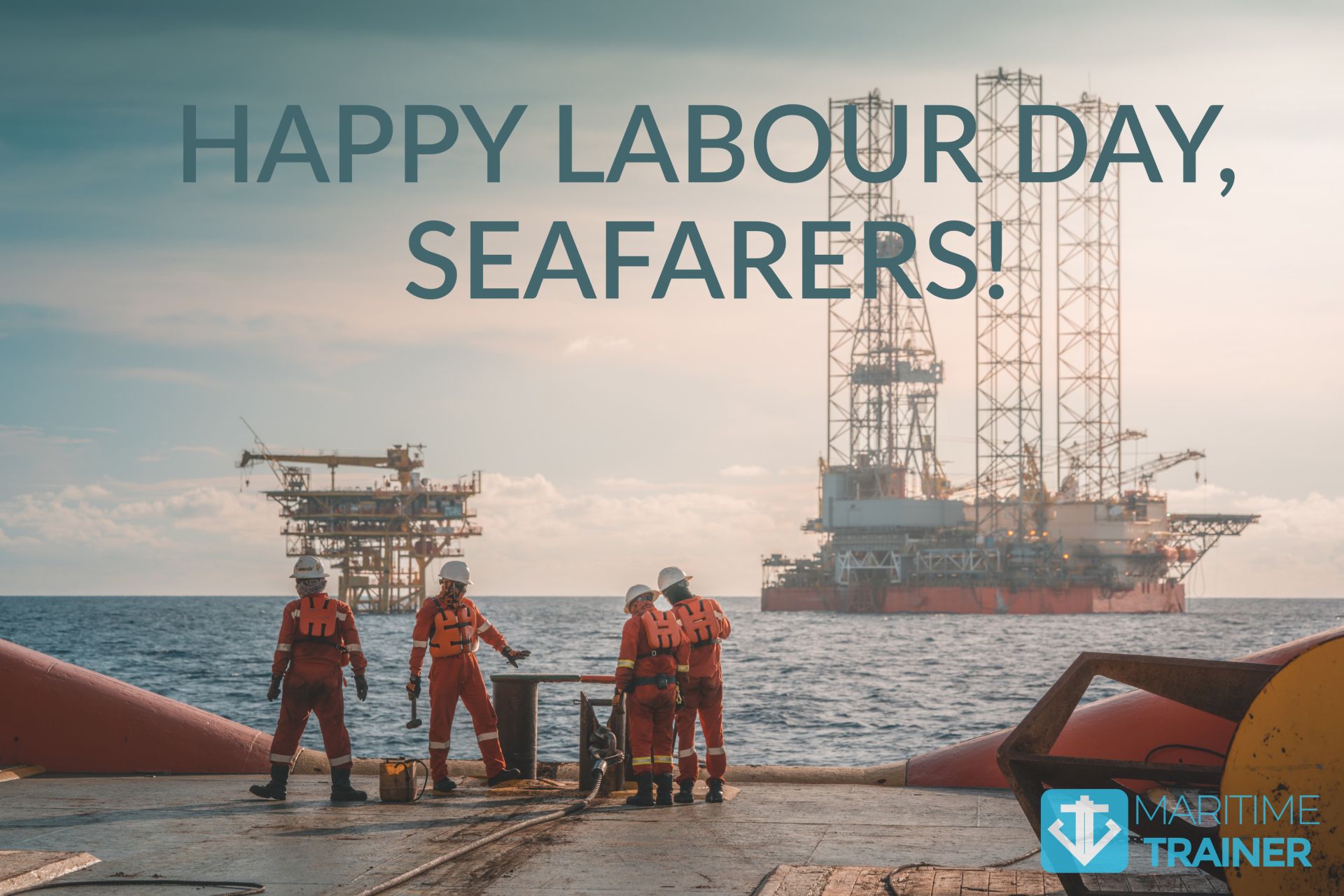Celebrating International Labour Day with a Focus on Maritime Professionals
Introduction
International Labour Day, also known as Labor Day, is a globally recognized holiday that celebrates the contributions and achievements of workers worldwide. On this occasion, it is essential to highlight the vital role played by maritime professionals in the global economy. This blog post aims to shed light on the significance of maritime workers and their contributions to international trade.

Maritime workers are the unsung heroes of the global supply chain. They are the backbone of international trade, ensuring the seamless movement of goods across continents. Without their dedication and expertise, the efficient exchange of resources would not be possible. As we commemorate International Labour Day, it is crucial to recognize the essential role these professionals play in shaping the global economy.
II. The Importance of Maritime Workers
Maritime workers play a critical role in facilitating international trade. Over 80% of global goods are transported by sea, making maritime transportation the backbone of the global economy. Without the dedication and expertise of these professionals, the efficient exchange of goods across continents would not be possible. The sheer scale of maritime operations poses unique challenges that demand skilled and committed individuals.
The maritime industry is a complex and multifaceted sector that requires a diverse workforce. From captains and crew members to port workers and logistics coordinators, each individual plays a vital role in ensuring the safe and timely delivery of goods. These professionals operate in a dynamic and ever-changing environment, navigating through unpredictable weather conditions, shifting trade patterns, and evolving regulatory frameworks. Their ability to adapt and problem-solve is crucial for the continued prosperity of the global economy.
III. Daily Challenges Faced by Maritime Workers
Maritime jobs are demanding and often involve long periods spent at sea and extended periods of isolation. These conditions can take a toll on the physical and mental well-being of maritime professionals. The unpredictable nature of the sea, harsh weather conditions, and the need to be constantly vigilant require immense resilience and adaptability.
The life of a maritime worker is filled with unique challenges that test their physical and mental stamina. Spending weeks or even months at a time away from their families and loved ones, these professionals must learn to cope with the isolation and loneliness that come with the job. The demanding nature of their work, which often involves long hours, heavy lifting, and exposure to dangerous equipment, can also take a toll on their physical health. Despite these challenges, maritime workers continue to demonstrate their commitment and resilience, playing a crucial role in the global economy.
IV. Safety and Training in the Maritime Industry
Given the challenging nature of their work, maritime professionals undergo rigorous training programs to ensure safety and efficiency. Training modules cover a wide range of areas, including navigation, emergency response, and cargo handling. These practical training programs equip workers with the necessary skills to navigate complex situations and mitigate risks. Continuous training and certifications are essential to stay up-to-date with evolving industry standards.
The maritime industry places a strong emphasis on safety and training, recognizing the inherent risks associated with working at sea. Maritime professionals undergo extensive training programs that prepare them for a wide range of scenarios, from navigation and emergency response to cargo handling and environmental regulations. These training modules are designed to not only equip workers with the necessary technical skills but also to instill a deep understanding of safety protocols and best practices. Continuous learning and certification updates are essential in this dynamic industry, ensuring that maritime professionals are always ready to face the challenges that come their way.
V. Preparing a Future-Ready Maritime Workforce
The maritime industry must adapt to technological advancements to remain efficient and competitive. Maritime Trainer, a leading training institute, recognizes this need and incorporates advanced technologies such as artificial intelligence and automation into its training programs. By embracing these innovations, maritime professionals can acquire the skills and knowledge required to navigate the future challenges and opportunities that lie ahead.
As the maritime industry evolves, the need for a future-ready workforce becomes increasingly crucial. Maritime Trainer, a leading training institute, is at the forefront of this transformation, incorporating cutting-edge technologies into its training programs. From the integration of artificial intelligence to the implementation of automated systems, these advancements are designed to equip maritime professionals with the skills and knowledge necessary to thrive in the industry's rapidly changing landscape. By embracing innovation, Maritime Trainer ensures that its trainees are prepared to tackle the challenges and seize the opportunities that the future holds, cementing the industry's competitiveness and resilience.
VI. Innovation Through Training:
Training plays a pivotal role in keeping maritime workers ahead of industry curves. Maritime Trainer implements innovative training techniques and programs that go beyond traditional classroom learning. These include immersive simulations, virtual reality training, and interactive workshops. By providing hands-on experience and practical knowledge, these initiatives ensure that maritime professionals are well-prepared for the dynamic and evolving nature of their work.
At the heart of Maritime Trainer's approach to training is a deep commitment to innovation. The institute recognizes that traditional classroom-based learning is no longer sufficient to meet the demands of the modern maritime industry. Instead, it has developed a range of cutting-edge training techniques that provide maritime professionals with a truly immersive and engaging learning experience. From virtual reality simulations that replicate the challenges of real-world scenarios to interactive workshops that encourage hands-on learning, these innovative programs equip trainees with the practical knowledge and skills needed to navigate the industry's ever-changing landscape. By embracing these forward-thinking educational approaches, Maritime Trainer ensures that its graduates are well-equipped to meet the evolving needs of the maritime sector.
VII. Supporting Mental Health
Working in high-stress maritime roles can have a significant impact on the mental well-being of professionals. Recognizing this, various initiatives and programs have been developed to support the mental health of maritime workers. These include access to counseling services, mental health awareness campaigns, and the promotion of work-life balance. By prioritizing mental health, the industry aims to create a supportive and resilient workforce.
The demanding nature of maritime work can take a significant toll on the mental health of professionals. Long periods at sea, isolation from loved ones, and the constant need to navigate unpredictable and potentially dangerous situations can all contribute to increased stress, anxiety, and burnout. In recognition of these challenges, the maritime industry has taken steps to prioritize the mental well-being of its workforce. Through initiatives such as access to counseling services, mental health awareness campaigns, and the promotion of work-life balance, employers are working to create a more supportive and resilient environment for their employees. By addressing the mental health needs of maritime workers, the industry can ensure that its professionals are equipped to handle the unique stressors of their roles, ultimately enhancing the overall productivity and safety of maritime operations.
VIII. Advocating for Ethical Employment Practices:
Ethical employment practices are crucial in fostering a positive working environment for maritime professionals. Maritime Trainer upholds and promotes these practices by ensuring fair wages, safe working conditions, and respect for workers' rights. By setting high standards, the institute encourages the broader maritime industry to adopt ethical practices and create a sustainable and inclusive work environment.
At the core of Maritime Trainer's ethos is a deep commitment to ethical employment practices. The institute recognizes that the well-being and fair treatment of maritime professionals are essential for the long-term success and sustainability of the industry. By ensuring fair wages, safe working conditions, and respect for worker rights, Maritime Trainer sets a high standard for the broader maritime sector. Through its advocacy efforts, the institute encourages other industry players to follow suit, creating a more inclusive and equitable work environment for all maritime professionals. This holistic approach to ethical employment not only benefits the workers themselves but also fosters a sense of loyalty, dedication, and pride among the maritime workforce, ultimately contributing to the overall success and competitiveness of the industry.
IX. The Global Impact of Maritime Workers
Maritime workers not only contribute to the global economy but also play a vital role in implementing eco-friendly and sustainable maritime operations. As custodians of the sea, maritime professionals are at the forefront of efforts to reduce carbon emissions, promote responsible waste management, and protect marine ecosystems. Their commitment to sustainable practices ensures the long-term viability of the industry and the preservation of our oceans.
The contributions of maritime workers extend far beyond their role in the global economy. As the custodians of the sea, these professionals are at the forefront of efforts to promote sustainable and eco-friendly maritime operations. From reducing carbon emissions to implementing responsible waste management practices, maritime workers play a crucial role in preserving the health and vitality of our oceans. Their commitment to sustainable practices not only benefits the environment but also ensures the long-term viability of the maritime industry itself. By championing initiatives that protect our marine ecosystems, maritime professionals are making a lasting impact on the global landscape, advocating for a more sustainable future for all.
X. Conclusion
On International Labour Day, it is essential to reflect on the invaluable contributions of maritime professionals. Their dedication and expertise enable the efficient movement of goods across the globe, driving economic growth and fostering sustainable practices. Let us celebrate and support maritime workers continually, acknowledging their vital role in shaping the future of international trade. Take a moment to appreciate their contributions and join the commitment to prepare them for the challenges and opportunities that lie ahead.
As we commemorate International Labour Day, it is crucial to recognize the unparalleled importance of maritime professionals. These individuals are the unsung heroes of the global supply chain, ensuring the seamless transportation of goods and resources across vast oceans. Their resilience, adaptability, and commitment to safety and sustainability are truly remarkable, and deserve to be celebrated and supported.
Moving forward, it is imperative that we continue to invest in the training, and well-being of maritime workers. By implementing innovative programs, promoting mental health initiatives, and advocating for ethical employment practices, we can empower these professionals to thrive in an ever-evolving industry. Only by prioritizing the needs and concerns of maritime workers can we ensure the long-term prosperity and sustainability of the maritime sector.
As we look to the future, let us be inspired by the remarkable contributions of maritime professionals. Their tireless efforts have shaped the global economy, and their dedication to sustainable practices has protected our fragile marine ecosystems. On this International Labour Day, let us pledge to honor, support, and uplift these unsung heroes, whose work is crucial to the well-being of our interconnected world.




